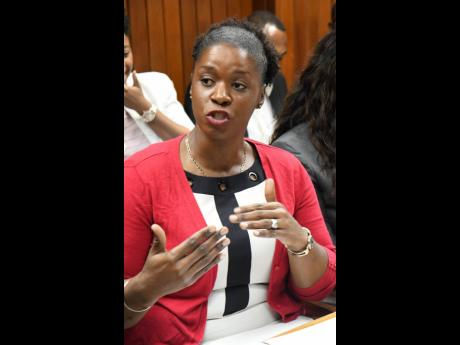Tackle math at all levels – Benjamin
National Mathematics Coordinator Dr Tamika Benjamin has asserted that to break the cycle of poor performance in mathematics, the subject must be tackled at all levels of the education sector.
The pass rate of Jamaican students in mathematics at the Caribbean Secondary Education Certificate (CSEC) level plunged by 23 per cent in 2021.
In the June-July exam administered by the Caribbean Examinations Council, only 38.2 per cent of the students earned grades one to three.
In 2020, some 61.2 per cent of students had passed the subject and 54.6 per cent had been successful in 2019.
Benjamin told a virtual Gleaner Editors’ Forum on Wednesday that if a weak foundation is laid at the early childhood level, it will impact the students’ ability to access what is being taught at the primary and secondary levels.
“Our approach at the ministry has always been to try to tackle all levels, not necessarily placing one as more important than the other. We have to deal with the issues at all points to break the cycle that we are now experiencing,” Benjamin said.
LEARNING LOSS
She said given the COVID-19 learning loss, the ministry’s main goal is to improve the quality of mathematics instruction and ensure that identified gaps are filled.
Benjamin explained that more than a decade ago, pre-service teacher education was highlighted as one of the contributing factors to low levels of performance.
It was found that 35 per cent of mathematics teachers did not attain a pass in the subject at the CSEC level or before they entered teacher training colleges.
“We would’ve implemented the National Mathematics Policy Guidelines in 2013 and one of our clear requirements was for our colleges to shift the matriculation requirements for mathematics,” she explained, adding that a grade one or two is required for teaching at the secondary level and at least a grade three to teach at the primary level.
“There was even a period where the central ministry, in approving appointments, was checking to ensure that teachers, even if they had the degree coming into the system, had the requisite requirements. We have changed our operational processes to support the policy position. I can’t tell you data-wise that we have seen a full turnaround because we are talking about seven years down the line and we would’ve already had teachers in the system. Certainly, those who have entered since have had to meet that requirement,” the national coordinator explained.
THE BENEFIT
More than 400 schools have or are in the process of implementing the specialist teacher arrangement. The strongest mathematics teachers are identified in primary schools and are given the responsibility of being the sole instructors of the subject within the school.
“We have schools that have gone ahead on their own to implement the model, because they have seen the benefit of its use in the past. That will help us to be a lot more targeted when we go in the schools. Instead of working with all teachers on the subject, we can focus on a third of the teaching population,” she said.
With the implementation of a subject-specific scholarship programme by the government in 2015, Benjamin said 400 new mathematics teachers have been added to the system.
However, she could not provide data on the number of mathematics teachers who have migrated in recent years.
“It’s quicker for us to find replacements, especially in the September period because we are seeing on average about 100 to 150 students graduating from our teacher training institutions and available to enter the system,” the national mathematics coordinator said.

